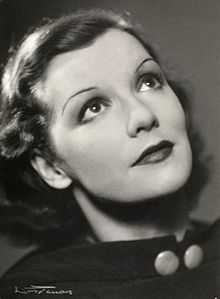Kirsten Heiberg
| Kirsten Heiberg | |
|---|---|
 Kirsten Heiberg, between 1930–1935 | |
| Born |
25 April 1907 |
| Died |
2 March 1976 (aged 68) |
| Years active | 1929-1970s |
| Spouse(s) | Franz Grothe (1938-death) |
Kirsten Heiberg (25 April 1907 – 2 March 1976) was a Norwegian actress and singer who had a major film career in Germany between 1938 and 1954. Heiberg was a Nazi, but was not punished by the Norwegians, as she was a German citizen.[1]
Biography
Heiberg grew up in a boarding school, and studied in Lausanne, Dijon and Paris. Later, she studied English in Oxford, England.
She made her debut at Den Nationale Scene in 1929, and in the 1930s at the Carl Johan-Teatret and Scala Revyteater in Oslo. After guest appearances in the operatta revue "Pam-Pam" at Theater an der Wien in 1937, she began a career in Germany both as a film actress and recording artist. She became one of Ufa's (Universum Film AG) biggest stars and The Third Reich's femme fatale - the "new Marlene Dietrich". In Vienna, she met the composer Franz Grothe. They married in Oslo in 1938 and moved to Berlin. Because she had not immediately joined the NSDAP, she had two years without work, but she soon rose to the top again (1943 in "Liebespremiere").
Back in Norway after the war, she met great difficulty in finding roles due to her time in Germany during the war. However, she was not arrested by the Norwegians since she was a German citizen by that time. In Germany, she was in four films after the war (see filmography). In Trondheim, she took an engagement as a resident at Trøndelag Teater 1952–60, acting in operettas, comedies, and serious classics and modern dramas. She also sporadically appeared in the Oslo scene in the 1960s and 70s.
She was the sister of author Else Heiberg.
On 15 August 2008, the premiere was held of the play "Glamour for Goebbels" at Haugesund Teater as part of the film festival. Elsa Aanensen played Kirsten Heiberg. Øyvind Osmo Eriksen was the instructor for the performance, and Halvor Lillesund was pianist. On 14 May 2009, the play moved to Det Åpne Teater in Oslo.
Film clips and music were integrated in the play. It contained film of Aanensen as Kirsten Heiberg, but no clips from her old films were used. "Glamour for Goebbels" mostly dealt with Heiberg's time in Berlin, where she lived a glamorous lifestyle.
Filmography and discography
Filmography
|
Discography
|
References
- ↑ Adresseavisen: Nazisten på Trøndelag Teater
External links
- Article on Kirsten Heiberg in Aftenposten
- "Nazi at Trøndelag Teater", Chronicle, 8 April 2009
|